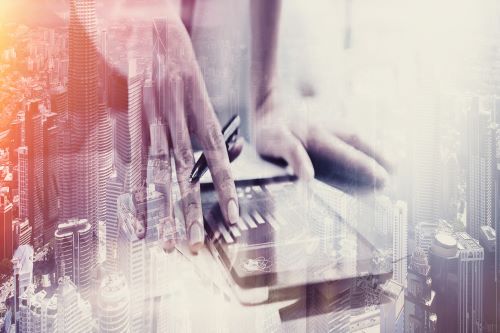Professor Anthony Finkelstein believes business schools need to be given the space to be the creative entrepreneurial forces they can and should be, in order for them to thrive in a highly competitive higher education system. He sees Bayes as a ‘pathfinder’ for City.
The new President of City, University of London, spoke to Dr Nettra Pan as part of the Food for Thought webinar series, discussing how his background in research and technology has shaped his understanding of higher education, why innovation is critical to our communities and where we must go next to keep up with the different demands of the global digital, knowledge-based and purpose-driven economy.
Professor Finkelstein has a close connection with City, in addition to having been a faculty member himself early in his career, his father, Professor Ludwik Finkelstein, was a world-renowned Professor of Measurement and Instrumentation who played a vital role in the development of City.
Professor Finkelstein, who said he had a ‘strong physical recollection of walking down St John Street’ from when he was a child, says however it was not his family ties that brought him back to City.
“I am here because of my own attachment to the University’s mission and possibilities. Sharing that background with my father is very nice and my early days here have reminded me of it, as well as seeing some of the older staff who knew my dad.
“I like a combination of intellectual shaping, academic cut and thrust, and management. I have always found the company of university colleagues very stimulating and enjoy the sharp edges of academia.
“City finds itself in a crowded higher education system – globally, nationally and in London. We need to assert our distinctiveness, align our actions with that and be self-confident in building it into our identity.”
Prior to taking up the new role at the beginning of July, Professor Finkelstein, an expert in software systems engineering, was the Government’s Chief Scientific Adviser for National Security for six years. He has also held the positions of Dean of the Faculty of Engineering and Head of Computer Science at University College London.
Labelling himself a ‘passionate friend but sometimes a critic of business schools’, Professor Finkelstein reflected on the workings of a business school and the need to overcome the restrictions of what may be expected of an institution.
“In the environment and space in which they operate, I would have expected business schools to be one of the most outward looking and inter-disciplinary organisations, who are the least captive to strong models of what academia is and should be.
“I have a feeling that during the early stages of business school formation the need to assure themselves of the rigour and validity of the disciplines they represent means they have almost become a static caricature of what they can and should be. We need to give business schools the space to be the creative entrepreneurial force they can and should be.
“City, as an institution, also needs to be agile and cut through bureaucratic structures. The University operates through committees, boards and papers which do not reflect how business works. These are old-fashioned models of how to achieve organisational control and performance and we need to move beyond them.”
Professor Finkelstein was asked by Dr Pan about the need to embrace change and develop practice.
“In terms of curricula, I would say three things about change. Those in almost every professional discipline will need much deeper technology skills than before, we need to find a way to deal with that. Secondly, we need curricula that are more global and culturally adaptable and sophisticated. Finally, I wonder whether universities have fallen short on the soft skills agenda and the skill of inviting oral debate and navigating social complexities, this is part of a university education and I think they have been underplayed.”
Professor Finkelstein also addressed questions on internationalisation – to which he believed City needed to bind together the sense of ‘local and global’ and ‘find itself in London to find itself internationally’ – and the need to teach deeper technological principles in case learned skills became obsolete over time.
“City’s leadership needs to provide support, role modelling, encouragement, empowerment, the space to have fun, and have a higher institutional appetite for risk. I recognise the feelings of exhaustion but sometimes that is the moment to make that next push,” said Professor Finkelstein.
You can watch an extended version of the conversation between Professor Finkelstein and Dr Pan here.



